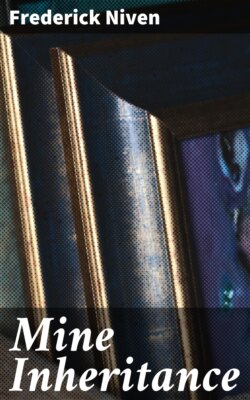Читать книгу Mine Inheritance - Frederick Niven - Страница 27
На сайте Литреса книга снята с продажи.
II
ОглавлениеTable of Contents
The storm did not immediately burst on our return to Red River in the spring. In fact there was a stony silence from the North-West Company forts and posts at which copies of that order had been delivered. There was no response of either We shall obey or We shall refuse to admit your authority.
The earlier and the later settlers alike were busy on their allotments of land. The Chisholms, during that last winter, had remained at Red River. Hugh had built a roomy house that, apart from the fact that it was of logs, took my mind back to Scotland, within and without. It was a strong building with attics that had dormer windows. “Haste ye back,” was always the parting cry for me when I left there to go to the writers’ quarters at Point Douglas under the stars in that high lift over the darkening and wind-whispering plain. I came to feel as one of the family there, to reckon Chisholm as a foster-father, Mrs. Chisholm as a second mother, Agnes, perhaps, as a tomboyish sister, but Mairi, somehow, not exactly as a sister though as one related—cousinly!
It irked me to hear her upbraided by her mother so often for faults that, in Agnes, would have been ignored or even looked upon with merriment as no faults at all. Mairi’s patience when screeched at by Mrs. Chisholm I admired greatly. She seemed to forgive instanter. Chap-fallen for a moment, she would speedily recover; and by her expression I knew she was condoning, saying to herself: “Poor mother has her worries. It is all so new and strange to her here.” And even if, as Mr. Chisholm occasionally protested, Mrs. Chisholm “made step-bairns” in the house, it had to be said for Agnes that she never showed any tendency to imitate her mother in carpings against Mairi. They were good friends these two girls so different in many ways, Mairi gentle and with a natural graciousness of manner, Agnes irrepressible, hoydenish.
Homing from the Chisholms under the stars I would still have the broad kitchen in my mind’s eye, its crusie and its home-made candles, the bellows hanging to one side of the cobble chimney. Longest in my mind’s eye would Mairi’s face remain. I would find myself in the midst of a wordless pæan in her praise; and then, the farm left behind, I would think of Fort Gibraltar, where Assiniboine lapsed into Red River, and be back there again, in memory, on my visit with Captain Macdonell, Hillier, and McLeod, and see that girl who, later, I had discovered was Court Nez’s daughter, Christina. On the remaining stretch of road from the farm to Point Douglas, the lights of Governor’s House and the administrative building and the writers’ quarters glinting like fallen stars, I would recall her dark eyes and the way she moved across the candle-lit room, and the night would seem utterly empty, she so far off in that convent at Quebec.
The next day I would be plunged again into the midst of the administrative affairs of the settlers and hear the Governor, over a survey of accounts brought in from the store by John Bourke to be viséd, remark once again that for all their sakes he looked forward to the day when the settlers would be self-supporting on their crops and herds. But whether the crops were that year to be profuse or scanty, we had not yet our own meal and flour nor a sufficiency of our own beef and mutton. Pemican: pemican had still to be the staple for the settlers.
The sole result of the embargo was that when messengers were sent to the posts of North-West Company and Hudson’s Bay Company requesting consignments for the Colony, and offering payment according to the terms of the embargo, all the agents of the North-West Company and most of the factors of the Hudson’s Bay Company protested either that they had none or but sufficient for their own needs.
News came to us of the war that had broken out between the colonists of the American seaboard who had won their independence and the old Mother Country, chiefly over the searching of American vessels on the high seas for British seamen by press-gangs from His Majesty’s warships. At first I think Captain Macdonell saw himself commanding a force of allied Hudson’s Bay men and North-Westers, our Colony men and troops of métis and local Indians, against invaders at what he called the back door. But we were farther off than even a back door, remote from that strife and with our own troubles that even then, indeed, were preliminary—though of course we could not know that—to bloodshed.
